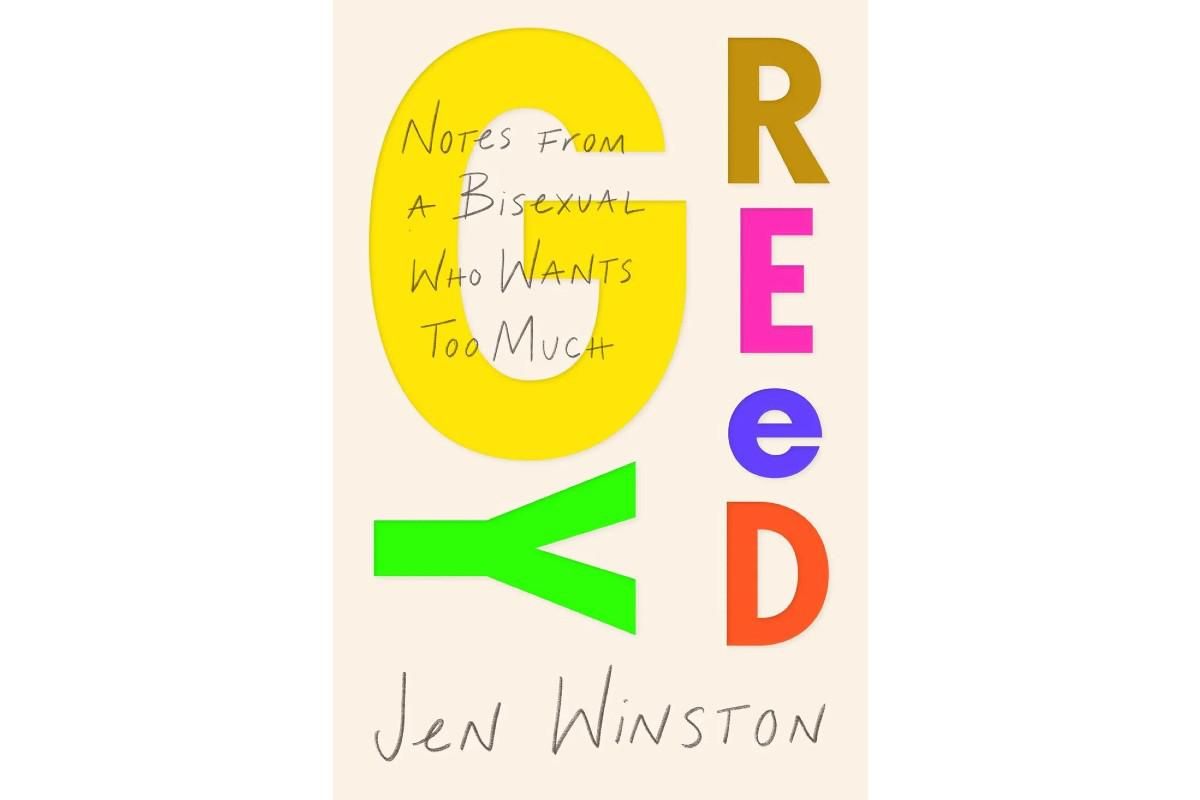Jen Winston's startling, candid, and illuminating memoir might just answer every question you've ever had about our bi brothers and sisters.
GREEDY: Notes from a Bisexual Who Wants Too Much is the debut work (but surely not the last) by Jen Winston (out on October 5 from Atria). Have you ever noticed how every #BiWeek (Sep. 16-23) the LGBTQ media posts helpful resource tools and mental health statistics about the 'B' folks without ever really connecting to the bisexuals among us...who make up the majority of our community.
Winston's book is so powerful precisely because she interrogates herself about her own orientation: what it means, what it looks like, how it works, how to express it, and how to explain it to others.
Photo courtesy of Landon Speers
Jen Winston
With wit and sophistication Winston skewers many of the stereotypes and misconceptions straights and gays have about bi folks. Such as..."everyone's probably bisexual." No, they're not, and that's a little bit like telling a POC you don't see color. The book also asks if bisexuals have an identity that forms a culture; and if they have bi privilege. And don't worry, Winston is never self-pitying but examines her own quirks with a merciless gaze in this series of linked essays.
Winston deftly treads a tightrope balancing her dating history with the evolution of intersectional queer theory and where bisexuality as an orientation fits into that; and how it can be understood using similar tools of critical thought and daily practice. It's an easy read: hilarious, heart-wrenching, confronting — and even a little mortifying to those people who ever put "no bisexuals" in a personal ad. Here's a little taste of what's in store for you inside GREEDY.
The Misconceptions of Bisexuality
Since there are so many misconceptions about bisexuality, we need to agree on some terms before talking about it. If you're already a scholar of bi politics, feel free to skip ahead (and to slide into my DMs). But if you're looking for a quick refresher, you're in luck:
- Bisexuality is a multisexual identity that includes all genders and is often defined as being attracted to more than one gender.
- Bisexuality and pansexuality are not mutually exclusive.
- Bi people are oppressed by a binary system called “monosexism," which suggests that everyone should either be straight or gay.
- The reason people think bi women are “just experimenting" and bi men are “actually gay" is because patriarchy has manipulated us into thinking that everyone must be attracted to men.
- The notion of “bi privilege" overlooks the serious issues bisexual people face. To name a few of those: Nearly half of bi women are r-pe* survivors (compared to 17 percent of straight women and 13 percent of lesbians), and bi men earn an average of 15 percent less than straight men (gay men earn roughly 5 percent less).
- Bi erasure means we don't have much data about bisexual people—especially not intersectional data, due to a lack of studies on nonbinary bisexuals and/ or Black, Indigenous, Asian, and other bisexuals of color.
- People often accuse bisexuals of only talking about our sexuality because we “like to feel oppressed." So to be clear: I, the author, am not oppressed. I have many privileges—I'm white, nondisabled, cisgender,** and relatively thin. I speak English, hold U.S. citizenship, and was raised in an upper-middle-class environment. I don't incur oppression based on racism, transphobia, ableism, fatphobia, classism, or xenophobia. I don't have to deal with being misgendered on a daily basis. I don't fear violence from the police. I don't have trouble accessing buildings or climbing stairs. Doctors don't suggest I should “lose some weight" when I go see them for a broken arm. I'm not constantly engaged in exhausting mental labor such as translating to another language in my head. Bisexuality is not a privilege, but my other privileges certainly paved the way for me to write a book about it. My perspective will always be shaped by this experience, so if you're wondering whether you should be reading something by a Black, Latinx, Asian, trans, fat, and/or disabled author right now, the answer is yes.
- Saying “everyone is bisexual" is a microaggression because it implies bisexuality isn't worth talking about.
- Not all bi people are promiscuous—in fact, 89 percent of bi women are in long-term monogamous relationships.
- If you're worried that bi people will cheat on you, your issue is with monogamy—not bisexuality.
- I'm not here to tell you that bi people aren't greedy or confused.
- On that last note, one of my favorite unlearning techniques is to look at any stereotype, assumption, or injustice, and simply ask: Why? If like an incredulous three-year-old, we keep repeating that one-word question, each answer will bring us closer to our world's deepest truths. It's like peeling an onion—the more layers we remove, the more we'll confront ideas that are so entrenched within our realities that we wouldn't have dared to question them outright. Sometimes it's hard to see that there was an onion in the first place. And, to fully round out this metaphor, sometimes peeling that onion can make us cry.
Greedy: Notes from a Bisexual Who Wants Too Much
* Please note that later mentions of this word are spelled out in full. (Mentions are indicated at the beginning of chapters by Content Warnings.)
** This means I identify with the gender I was assigned at birth. (Which I do—for the most part.)
Copyright © 2021 by Jen Winston. From GREEDY: Notes from a Bisexual Who Wants Too Much by Jen Winston. Reprinted by permission of Atria Books, a Division of Simon & Schuster, Inc.
